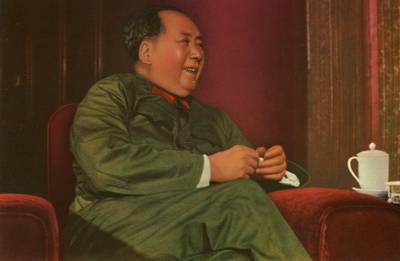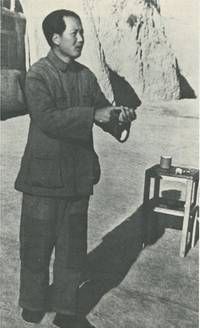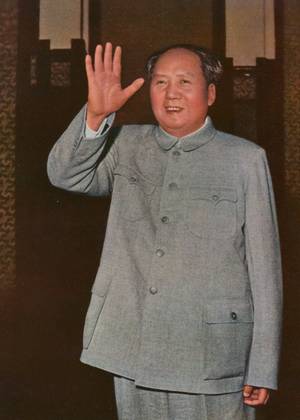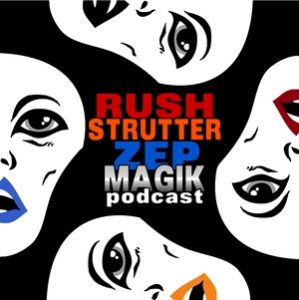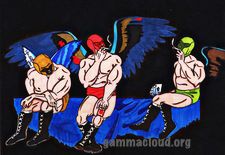Introduction | Lecture Two | Special Collections
The Thought of Mao Tse-tung Itself: How Can We Best Come to Understand It? (Rick Salutin, 1972)
Dealing with Maoism and Mao’s thought means necessarily fighting what is largely a rear-guard defensive action. It has to be so because there is so much misconception, so much preconception, so much distortion, so much misinformation, so much ignorance and, of course, has been so much straight, fraudulent lying done about China and about Mao’s thought that we have to begin by recognizing that we don’t start off with a clean slate—with the ability to place Mao’s thought in its own terms. An easy example of the degree to which view in the west have been controlled…and screened through the Western press due to the Western blockade of China is, for example, the fact that Time magazine now can refer to the leaders of communist China as “Men who mean what they say and say what they mean.” High praise, indeed in the Western idiom—the sort of language that one would apply to John Wayne. And yet, a mere matter of months ago, the Chinese leadership was still being referred to as, “inscrutable in the traditional sense and devious in the modern sense.” We’ve been very much at the mercy of the Western press and the releases which the Western diplomatic corps have been willing to make concerning China. And they’ve been almost consistent—almost always wrong.
There are other problems of distortion that we have to acknowledge at the beginning, as well. One comes from the Chinese themselves, who have insisted in their presentation of themselves to the West on an idiom—I would almost say—on a form of translation, literally of translation from Chinese to English, which has made it very hard for people accustomed to Western idioms—English, for instance—to take Maoism seriously.
Another source of preconception and of difficulty in approaching Maoism head-on has been the self-presentation of so-called Maoist groups in the West who, in many cases, have presented what amounts to a caricature of Maoism rather than a presentation which would make it a viable alternative and in fact have, in many ways, precluded the possibility of taking Maoism seriously by in so many ways aping the Chinese idiom and not adequately translating it into Western forms, that it becomes a sort of self-mockery.
Another problem—a more direct problem is, perhaps, the style of writing of Mao himself. This presents itself under a number of heads. Simply in translation, for example: Consider the Chinese phrase for “bad elements,”[1] something which would be adequately compared in Western sociologies to a term like “negative social factors” or “deleterious societal influences.” The Chinese phrase for this consists of four separate pictures…pictures which refer to ox, devil, snake and god. In English, this is apt to be translated: “freaks, ghosts, monsters and demons”; something which is liable to put off a Western reader…which is actually something we can cope with in the Chinese. But it comes also from a different form of sentence structure and I’d even say thought structure. The Maoist literature is presented in simple sentences and we’re accustomed in Western thought—particularly in philosophical and political thought—to a great deal of complexity and to numerous subordinate clauses and qualifications rather than a straightforward, subject/predicate, subject/predicate presentation. We become suspicious; why we’re used to the subject/predicate presentation is, for example, in learning to read books. An one becomes suspicious when confronted with the Maoist literature that we’re dealing with something on the level of kindergarten. I say this is a “prejudice.” It also comes from the simplicity of the thoughts themselves; Western intellectuals have a preference for ambiguity and vagueness. It’s a basically aesthetic preference. We tend to take clear positions as a sign of falsity or, at least, superficiality. It’s not that the Maoist picture of reality is not complex; it is full of complexities but it is a complex reality which is comprehensible, which, with a sufficient amount of analysis and presentation can be seen through and described and it’s been a Western prejudice that—as reflected in existential literature and theater of the absurd—that clarity is suspect.
We’re also, I think, embarrassed by this style of writing. We’re embarrassed by simple statements of profound truths. For example: when Mao makes a statement such as, “Very often, a good thing can become a bad thing and a bad thing can become a good thing,”[2] it sounds almost too simple to be either true or important. In fact, it’s both. And the process which leads to that statement—and the conclusions which follow from—are complex and very, very important. Still, the principle itself, as with most profound truths, is quite simple and direct. Well, this is a way of trying to clear some of the ground because the necessity of this sort of “rear guard action” we have to constantly fight in dealing with Mao’s thought.
Now let me take an example. Take, to begin, a statement from a very early work of Mao’s, written in 1927 when Mao traveled to the province of Hunan in southern China to investigate the peasant uprisings there: He wrote—and these would be very prophetic words:
In a very short time, in China’s central, southern and northern provinces, several hundred peasants will rise like a mighty storm; like a hurricane; a force so swift and violent that no power, however great, will be able to hold it back. They will smash all the trammels that bind them and will rush forward along the road to liberation. They will sweep all the imperialists, warlords, corrupt officials, local tyrants and evil gentry into their graves.[3]
Let me just comment that it’s that sort of stringing together of phrases which sounds to us like a sort of rote. In fact, it’s not; each one of those designations—imperialists, warlords, corrupt officials, local tyrants and evil gentry—is very specific and very meaningful. He just doesn’t bother to specify the names and places. But in the Chinese context, those things all have their meaning. But he goes on:
Every revolutionary comrade and every revolutionary party will be put to the test; to be accepted or to be rejected as they decide. There are three alternatives: to march at their head—that is, at the head of these peasants who will rise up—and lead them; to trail behind them, gesticulating and criticizing; or to stand in their way and oppose them. Every Chinese is free to choose but events will force you to make the choice quickly.
Now before we can go into the central content of that statement, which is the role of the peasantry in the Chinese Revolution, I want to point out the way that the statement comes about. It comes about from Mao traveling to an area in which peasant uprisings were the order of the day—were taking place— and studying them to find out what was happening in the revolution. In other words, here’s the revolutionary leader going to the revolution to find out what it’s all about. It’s not the image of a leader who makes the revolution, who conceives it and imposes it, but who discovers it, investigates it, learns from it (already underway) and then returns to his own constituents—to the Party and other parts of the country—and formulates them in what’s happening. Mao’s phrase for this is a phrase which says, “From the people, to the people.” That is, a constant sense of interaction between the leadership and the people…who attempt to lead and mold events and events themselves as they are already given. This is an intricate role for leadership and one that we’ll have to look at later.
The [above] quotation also brings us to the question of the role of the peasantry in the Chinese Revolution. Mao’s been accused of heresy on the grounds of the role which he assigned—not only assigned to but also, in many ways, created for the peasantry in the making of the Chinese Revolution. He’s accused of this by Marxists and non-Marxists; he’s accused that this is not really Marxism because in Marxism the leading role in the revolution is assigned to the industrial proletariat—the working class…the urban working class. The history of China is replete with peasant rebellions, all of which failed. And the reason they failed is due to the innate weaknesses of the peasantry as a political class; to their isolation, individualism and also their inability to see the total situation; what Mao referred to as “the well-bottom view.” What can you see from the bottom of a well? You can see the sky; well not really. You can just see the part of the sky that’s passing over. The peasantry were like people at the bottom of a well. They never had a real grasp—a full grasp of the totality of the situation, whereas the viewpoint of the industrial working class is a viewpoint of a group which is in a far more advanced historical situation. A situation in which the organization of the economy and production has reached a much more interdependent level and in which the forces toward which the situation all over the world were leading, as already were being revealed in many ways. For that reason, in order for a revolution in which the peasantry were the engine, the driving force to succeed, it was necessary for them to be led from a standpoint other than that of a peasant standpoint, with the leadership that was a proletarian, working class, urban-based—with all that that implies—Marxist leadership.
Now..to be sure, that’s a variation on the traditional Western European Marxist image but I don’t think it amounts to a heresy. Even from the discussion so far, it’s possible to reach the core of Maoist thought—a Maoist analysis of the situation—which is what Mao understands by dialectic. In a sense, what we mean by “dialectic” is a sense of movement and change through time. What is political thinking in the Maoist context? It is examining and reexamining the actual situation constantly. Why is it necessary to constantly examine and reexamine the situation? Because every situation is in a constant state of change. No analysis of the moment will suffice for the following moment. At the moment when Mao went to Hunan, the central event which was happening in China from a revolutionary view was the beginning of peasant uprisings. It was necessary to seize on this and to draw the conclusions for it. As the situation developed, other aspects became foremost. This is implied in the Maoist theory of the stages of revolution. So he has a sense of the transitional character of revolutionary struggle; that it moves from stage to stage. For example, in the period between 1924 and 1927, there was an alliance between the Communists and the Kuomintang in China. Following 1927, that became an opposition and the…Chinese Communists were largely expelled from their bases in the cities and moved to the countryside. This occurred between ’27 and ’36. In 1936, the situation altered again and the central problem became the incursions of the Japanese into China. In ’45, with the defeat of the Japanese, the central conflict came to be between the communists and the Kuomintang again, and so on, until the present time.[4]
Each of these represents stages in the revolution. How does one recognize a stage in the revolution? A stage is defined as in terms of the central alignment of opposing forces which occurs at that time, which is what Mao would call the central contradiction.[5] For example, in the period between between ’27 and ’36, the central contradiction for the Chinese Revolution was between the forces of the communists and the forces of the Kuomintang—Chiang Kai-shek—and all strategy and tactics had to be based on that. Following ’36, the central contradiction turned into that between the Japanese and the entire Chinese nation. The Japanese incursions into China had become so serious that—in Mao’s opinion—they became the order of the moment and the communist negotiated an alliance with their—up until then—mortal enemies, the Kuomintang ; namely, Chiang Kai-shek and his forces.
Now how did that come about? Is this merely a form of shifting, a sort of random testing of the breeze? Well, I think that’s exactly what’s meant by a sense of a dialectic; that, prior to ’36, a situation had been one way and post ’36, it had simply changed and was up to the revolutionary leadership to alter its analysis of that situation and its behavior within it.
The question that on always asks oneself when thinking politically is: “What is happening now?” in order to determine what to do. And the chief aspect of what is happening now is, I think to put crudely, “Who is the main enemy of the moment?” Well see, the genius of Mao and his success in being the figure behind the Chinese Revolution has been his success at every stage of the Chinese Revolution in figuring out who was the main enemy of the moment, what was the central opposition, who had to be opposed in order for the cause of the revolution to be advanced.
To sum up so far then, the core of the Maoist thought is the sense of dialectics of change and of the constant questioning of what new elements have entered the situation and what that requires in terms of practice. And further, we have a sense of the relationship between theory and practice. Namely, that revolutionary theory is precisely the answer to the question, “What do you do now?” And the two greatest revolutionary theorists, namely Lenin and Mao, have been preoccupied at almost all times with exactly that question. In other words, revolutionary theory is not something which comes from what we can call pure theorists, people who retire from active day to day struggles to, say, universities and write books.
Now let’s go on to what is perhaps the central point in Maoist thought and practice and also perhaps the greatest contribution of Maoism which is a question of the relationship between the revolutionary leadership and its constituency, or its followers – the people, the masses as they’re sometimes described in Maoist literature. Let me quote…let me refer to something which Edgar Snow wrote about Mao. He writes:
Mao can rarely speak long without making a homely wisecrack or an epigram and he seems to maintain his leadership by winning all the arguments.[6]
That’s an extraordinary image, given the sort of image that’s been propagated about Mao for many years. Mao seems to maintain his leadership by winning all the arguments; that means in argument, not at the point of a gun.[7]
He goes on:
He is very well read and an accomplished dialectician in debate. He has an interesting technique. He seldom makes a frontal attack against opposition. He delivers a blow here, another there; he outflanks his opponents’ case, he breaks down its defense one by one, until gradually he has it completely encompassed and it falls apart before a last witticism or a telling stroke of logic.[8]
Now maybe what we should say about that is…I think the Chinese Revolution is probably the most talky revolution that has ever been. Mao’s power is not and never has been monolithic. His establishment of his power has over and over been a question of persuading others to take his point of view. I think that we can say this is not a personal quirk – it follows from the character of Maoist theory that I was trying to talk about before – that sense of a constant nature of flux in reality. Why? Because every situation is always in flux; the situation in which we’re in is always changing and no answers endure. There is always a need to reopen discussion. Therefore, unquestioning loyalty to any individual or to any line is out of the question. That person will be right in any situation who reexamines that situation correctly and comes up with a new interpretation which is most appropriate. That’s what I take Snow to mean when he says that Mao “maintains his leadership by winning all the arguments” because he’s developed this technique of examining and reexamining the situation to such a high degree.
Mao, for instance, wrote during the Cultural Revolution:
Marxism-Leninism consists of many truths but they all boil down to one sentence: “It is right to rebel.”[9]
I think that’s a remarkable statement as well and this is from the midst of the Chinese [Cultural] Revolution…almost 20 years after the revolution succeeded in what seemed to be its main goal, namely the overthrow of Chiang Kai-shek’s regime and the establishment of communist leadership in China, Mao is still saying “It is right to rebel.” That means that authority is – again it’s the same point – that an authoritarian position is theoretically impossible because the situation is always changing and there’s always the necessity to redefine; no answer is perpetually valid.
To refer to another statement where Mao says:
Whatever we do, authoritarianism is always erroneous because, as a result of our impatience, it makes us go beyond the degree of the people’s awakening and violates the principle of voluntary action on the part of the masses.
Let me try and concretize that as the way in which the communist leadership operated with its constituency in China: When, for instance, the Red Army moved into an area and took over control if it – in a rural area – the first item on the agenda was the redistribution of land. Now that could’ve been done in an authoritarian way; namely, by dispossessing the landlords and having communist administrators and army men redistribute the land. That wasn’t how they did it. What they would do is they would call mass meetings of the peasants in a village and urge them and encourage them to denounce the landlords and – on the basis of the crimes which have been perpetrated against the peasants by the landlords – to dispossess them and to redistribute the land among themselves [the peasants]. What’s remarkable is that the peasants were reluctant to do that as they were owing to centuries of habitual acceptance the situation of landlords. They wouldn’t impose it themselves. They would adjourn the meetings and spend more time talking to peasants in small groups or individually, encouraging them to speak up in a very didactic way; like teachers with students, urging them and encouraging them until eventually the peasants would take the initiatives.
Another example is the way in which collectivization took place; namely collectivization of agriculture. In the Soviet Union and Eastern Europe as we well know, this was a bloody and very unsatisfactory process; namely, the transition from individual ownership of the land by the peasants to whom it had been redistributed to large collective farms. The principle of collectivization in China was again a voluntary principle. Only when people had become convinced that they would do better, live better, by collectivizing and pooling their efforts did the collectivization take place.
I think what’s particularly interesting is what is behind this principle of anti-authoritarianism; this insistence that all action – to the highest degree possible, at any rate – be voluntary on the part of the people. Well, I’d say what was behind it was the conviction that that’s the only way it works; that unless people take power into their own hands and take control of their own lives themselves, that any changes which are made, any changes which are imposed from above will be partial and will ultimately fail.
If all this is true, if Maoism is based on the principle of voluntary action on the part of people and that there are no correct answers, no eternal answers, how can it be that there is such an enormous emphasis on Mao Zedong in China and on the person of Mao Zedong? Well, I’ll just make a few comments: One is that it would be incorrect to identify the persona of Mao Zedong in China with that which Stalin had in the Soviet Union. The “cult” of Stalin was a means of enforcing loyalty regardless of policy… “of enforcing loyalty” would be to the Soviet communist leadership. In China, the emphasis on the personality of Mao Zedong has been far less and almost always the emphasis is on Mao’s thought; after all, what we have the Red Guards waving is neither guns nor pictures of Mao but books. And in a peasant society which was largely pre-literate and only gradually achieved literacy, one of the chief means of establishing a point of view was on the emphasis of a central heroic personality. I think what’s crucial at all points is that this personality was not used to stifle thought but, on the contrary, to stimulate it through the emphasis on his thought, on the mass distribution of his writings and the constant study and discussion and application of them. ✭
1. An example of this is provided in Mao’s “Comment on the Open Letter of the Central Committee of the CPSU (IX), commonly referred to as “On Khrushchov’s Phoney Communism and Its Historical Lessons for the World,” penned in 1964:
But they must especially watch out for careerists and conspirators like Khrushchov and prevent such bad elements from usurping the leadership of the Party and government at any level.
2. Section X of Mao’s 1957 speech “On the Correct Handling of Contradictions Among the People,” entitled “Can Bad Things Be Turned Into Good Things” explores this duality in some detail:
…we must learn to look at problems from all sides, seeing the reverse as well as the obverse side of things. In given conditions, a bad thing can lead to good results and a good thing to bad results.
3. From Mao’s Report on the Peasant Movement in Hunan, compiled January-February 1927.
4. Discussed in detail in Mao’s 1937 work, “The Tasks of the Chinese Communist Party in the Period of Resistance to Japan.”
5. See Mao’s 1937 essay, “On Contradiction.”
7. Here, Salutin appears to be alluding to Mao’s famous assertion that “political power grows out of the barrel of a gun,” drawn from “Problems of War and Strategy,” part of Mao’s November 6, 1939 concluding speech at the Sixth Plenary Session of the Sixth Central Committee of the Party. In this address, Mao expounds upon this premise, stating that the gun does not command the party but is nevertheless necessary for the Red Army to seize and retain state power from the ruling classes and/or occupying foreign powers.
9. Reiterated and discussed in some detail in Mao’s “A Letter To The Red Guards Of Tsinghua University Middle School,” dated August 1, 1966.

